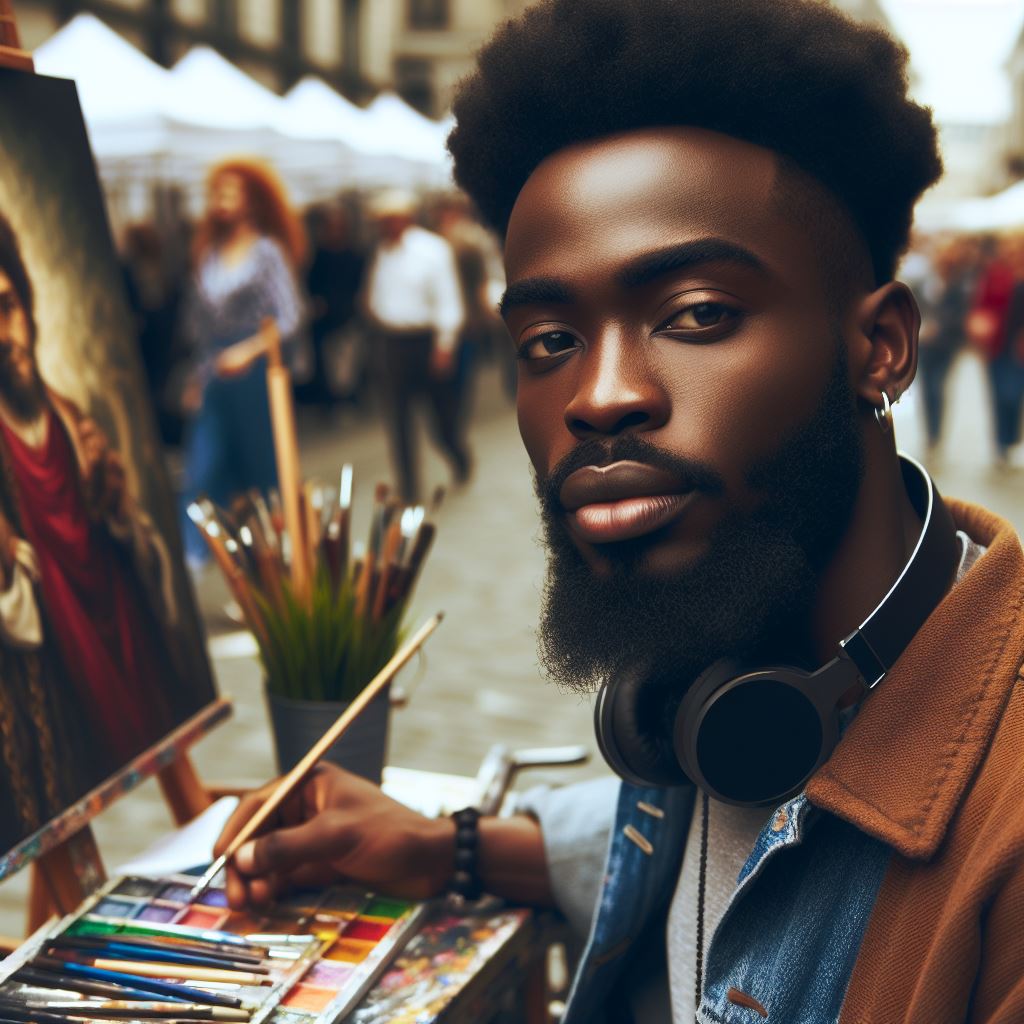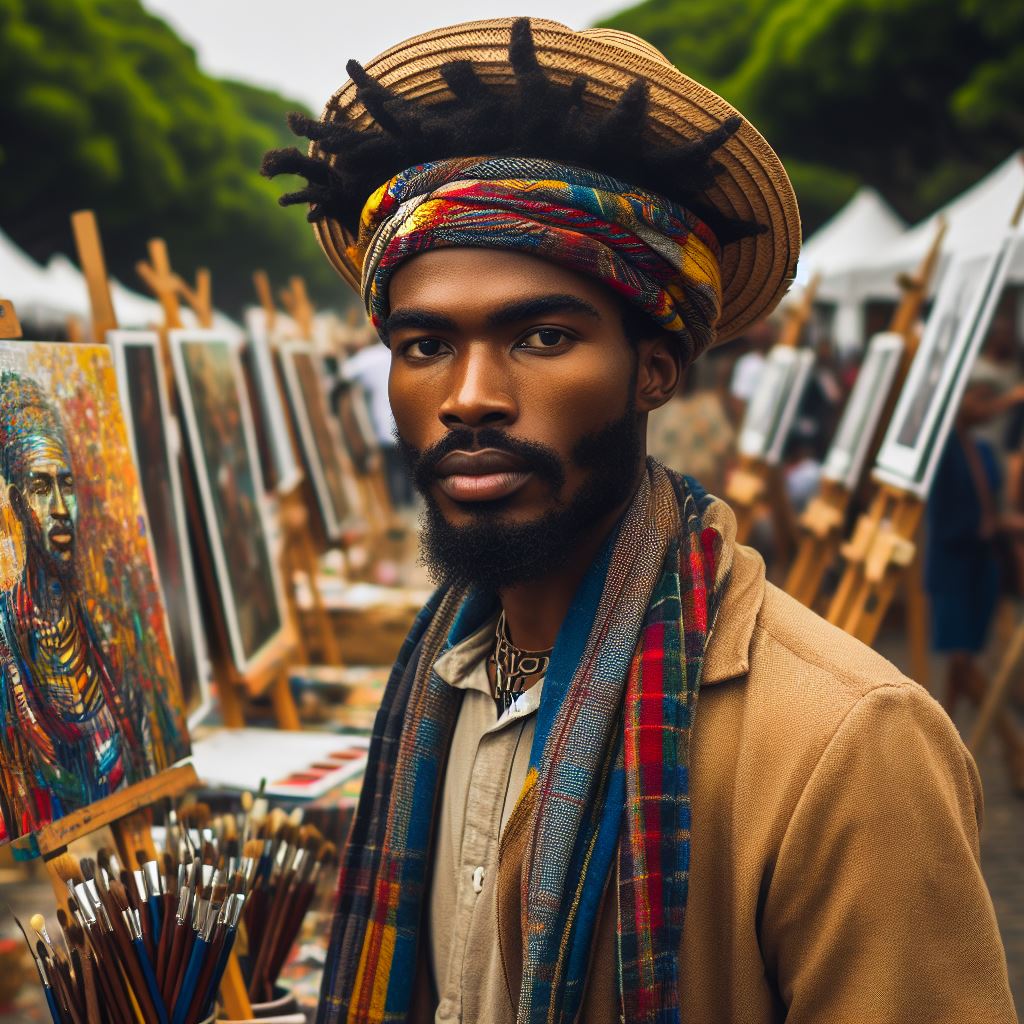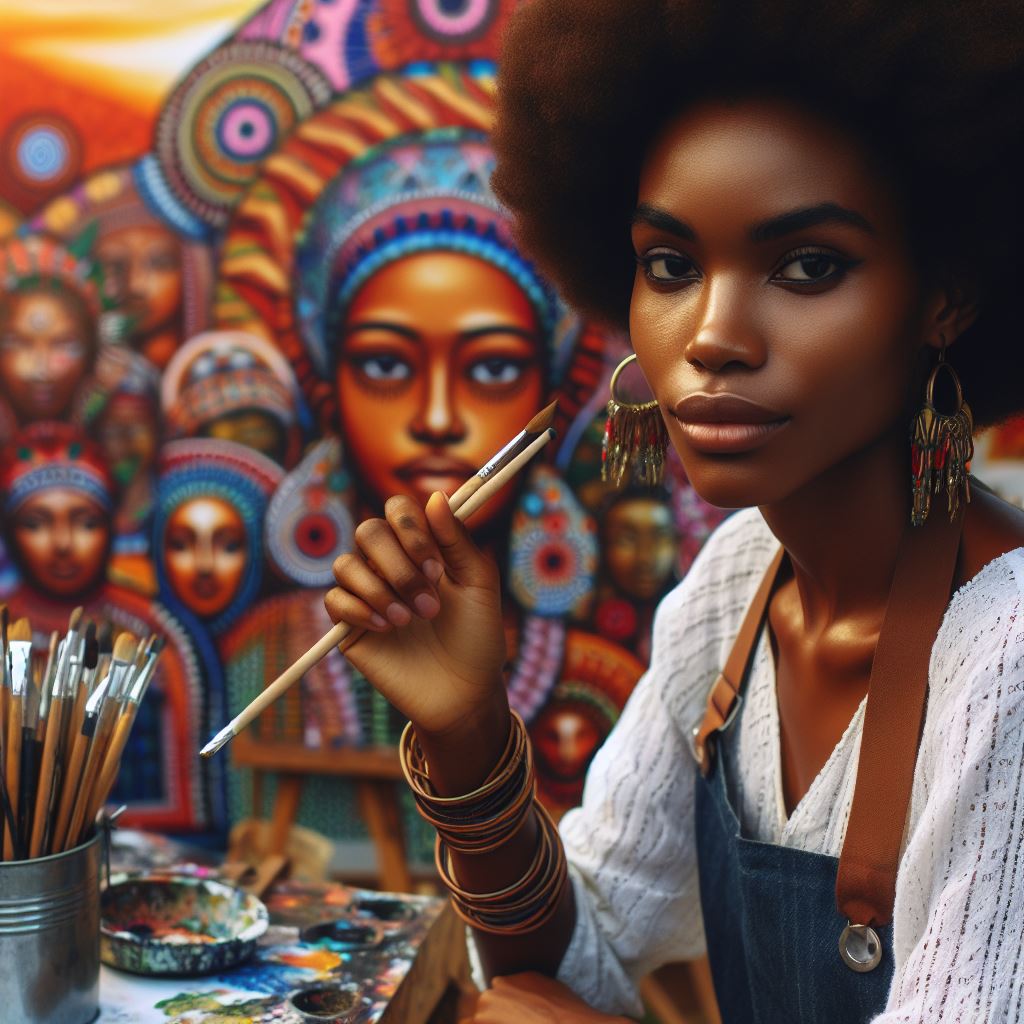Introduction
Art therapy involves the use of creative techniques to improve mental health and well-being.
It utilizes the process of creating art to explore feelings, reconcile emotional conflicts, foster self-awareness, and manage behavior.
Art therapy is essential in promoting mental health and well-being as it offers a non-verbal form of expression that can be especially useful for individuals who struggle to verbalize their emotions.
It provides a safe space for individuals to explore their thoughts and feelings through the creation of art.
In recent years, there has been an increasing popularity of art therapy in Nigeria as more people recognize the benefits of using art as a therapeutic tool.
As a result, more individuals are seeking out art therapists to help them navigate their mental health challenges and improve their overall well-being.
History of Art Therapy in Nigeria
Overview of the origins of art therapy
Art therapy in Nigeria finds its roots intertwined with traditional healing practices, where art and spirituality played integral roles.
Before the formal introduction of Western psychology, indigenous cultures across Nigeria utilized art as a means of expression and healing.
Community organizations, schools, and rehabilitation centers began integrating art-based interventions, acknowledging creativity’s potential in fostering mental well-being and personal development.
Colonialism introduced Western psychology, reshaping healing practices in Nigeria during the 20th century.
While traditional methods persisted in many communities, the formalization of art therapy as a psychological practice began to take shape.
Western concepts of psychology, including the understanding of the therapeutic benefits of artistic expression, gradually merged with indigenous beliefs and practices.
Introduction of art therapy in Nigeria
The formal introduction of art therapy in Nigeria can be attributed to the efforts of Western-trained psychologists and mental health practitioners.
As Nigeria underwent rapid social and cultural changes, particularly in urban centers, there arose a need for innovative approaches to address mental health issues.
These practitioners, drawing from abroad training, i
As awareness of art therapy grew, so did its application beyond clinical settings.
Dr. Aniakor, integrating indigenous art and rituals, champions modern therapy with Western psychology and African healing.
This expansion began integrating art therapy into Nigerian society, moving beyond Western models.
Pioneers and key figures in the development of art therapy in Nigeria
Dr. Chike C. Aniakor stands out as a pioneering figure in the development of art therapy in Nigeria.
Local practitioners collaborated with international organizations, enriching Nigeria’s art therapy landscape, fostering cross-cultural exchanges.
These collaborations spurred innovative healing approaches through art.
He emphasized cultural sensitivity, paving the way for art therapy’s growth in Nigeria.
In addition to Dr. Aniakor, other key figures emerged in the field, each contributing their expertise and insights to its development.
Local practitioners collaborated with international organizations, enriching Nigeria’s art therapy landscape, fostering cross-cultural exchanges.
These collaborations spurred innovative healing approaches through art.
These pioneers and key figures shaped art therapy in Nigeria, elevating it to a recognized therapeutic modality.
Read: The Evolution of Nigerian Art Over Decades
Benefits of Art Therapy in Nigeria
Art therapy in Nigeria has been shown to have numerous benefits for individuals seeking mental health support and emotional well-being.
Healing properties of art therapy
Art therapy allows individuals to express themselves creatively, which can lead to healing on a deep emotional level.
The act of creating art can be therapeutic and cathartic.
Improvement in mental health and emotional well-being
Engaging in art therapy can improve mental health by providing a safe space for individuals to explore their emotions and work through issues.
This can lead to increased self-awareness and a better understanding of one’s feelings.
Coping mechanism for stress, trauma, and anxiety
Art therapy provides individuals with a healthy outlet for coping with stress, trauma, and anxiety.
By expressing themselves through art, individuals can release pent-up emotions and find a sense of relief.
Art therapy, in Nigeria’s lacking mental health services, can promote emotional well-being and provide support.
Additionally, art therapy can help individuals develop new coping skills, gain insight into their thought patterns, and improve their overall quality of life.
Art therapy can also help individuals build self-esteem and confidence, as they see the positive impact their creative expression has on their mental and emotional well-being.
Art therapy in Nigeria uniquely and effectively addresses mental health, exploring emotions and fostering healing through creative expression.
Creating art helps individuals learn to communicate feelings nonverbally, aiding those who struggle with verbal expression.
Read: Interview with Emerging Nigerian Artists
Transform Your Career with Expert Guidance
Get personalized mentorship consulting that’s tailored to your unique path. Our expert advice is actionable and exclusive.
Get StartedArt Therapy Techniques
Art therapy techniques are varied and diverse, tailored to individual needs and preferences.
Different methods and approaches used in art therapy
- Visual Journaling: Writing combined with visual art to express emotions.
- Painting and Drawing: Utilizing colors and shapes to convey feelings.
- Sculpting: Using clay or other materials to create tangible representations.
- Collage: Arranging and pasting images to communicate thoughts and experiences.
- Photography: Capturing moments and perspectives through the lens.
How art therapy sessions are conducted in Nigeria
In Nigeria, art therapy sessions are typically conducted in a safe and supportive environment.
Art therapists guide clients through various art exercises based on their needs.
Clients are encouraged to explore their emotions, thoughts, and experiences through art.
Therapists may use different techniques such as drawing, painting, or sculpting during sessions.
The goal is to promote self-expression, healing, and personal growth through creative means.
Case studies or examples of successful art therapy sessions in Nigeria
A young girl struggling with trauma found solace in creating visual journals.
Through painting, a man recovering from depression expressed his emotions effectively.
At a rehabilitation center, sculpting helped individuals cope with addiction and recovery.
Collage therapy was used to assist survivors of domestic violence in processing their experiences.
Photography workshops empowered marginalized communities to share their stories and perspectives.
Overall, art therapy in Nigeria utilizes a range of techniques to facilitate healing and personal growth in individuals facing various challenges.
These methods not only promote self-expression but also encourage individuals to explore their inner selves and develop coping mechanisms for their emotional well-being.
Read: How Nigerian Art Reflects Cultural Heritage

Challenges and Stigma
Art therapy faces several challenges and stigmas in Nigeria, hindering its widespread acceptance and integration into the country’s mental health care system.
Cultural attitudes towards mental health and therapy in Nigeria
One of the primary challenges faced by art therapy in Nigeria is the prevailing cultural attitudes towards mental health and therapy.
In many Nigerian communities, mental health issues are often stigmatized and viewed as a sign of weakness.
This negative perception can make it challenging for individuals to seek help, including through art therapy.
Lack of awareness and understanding of art therapy
Furthermore, there is a lack of awareness and understanding of art therapy in Nigeria.
Many people are not familiar with the concept of using creative expression as a therapeutic tool.
This lack of knowledge can lead to misconceptions about the effectiveness and benefits of art therapy, further contributing to the stigma surrounding it.
Overcoming stigma and misconceptions surrounding art therapy
To overcome these challenges and stigma, education and awareness-building initiatives are crucial.
Mental health advocates and practitioners must work together to promote the benefits of art therapy and dispel misconceptions about its efficacy.
Training programs can also be developed to equip more mental health professionals with the skills and knowledge needed to incorporate art therapy into their practice.
Additionally, community engagement and outreach efforts can help increase the uptake of art therapy in Nigeria.
By collaborating with local organizations and leaders, art therapists can raise awareness about the value of creative expression in promoting mental well-being.
These efforts can also help reduce the stigma associated with mental health issues and encourage more individuals to seek help through art therapy.
In fact, while challenges and stigma exist around art therapy in Nigeria, there is also great potential for growth and acceptance.
Art therapy can support mental health in Nigeria by addressing culture, raising awareness, and forming community partnerships.
Read: Top Art Festivals Celebrated in Nigeria
Art Therapy Centers in Nigeria
The art therapy is a unique form of therapy that utilizes the creative process of making art to improve a person’s physical, mental, and emotional well-being.
In Nigeria, there are several art therapy centers that offer these services to individuals seeking healing and self-expression.
Overview of Existing Art Therapy Centers in the Country
- Sheba Centre for Creative Therapy: Located in Lagos, Sheba Centre offers art therapy sessions to children, adolescents, and adults dealing with various emotional and psychological issues.
- The Arts in Medicine Project (AMP): Based in Abuja, AMP provides art therapy services to patients in hospitals, as well as training programs for healthcare professionals.
- The LightHouse: Situated in Port Harcourt, The LightHouse focuses on using art therapy to help individuals cope with trauma, grief, and anxiety.
Services Offered by These Centers
Art therapy centers in Nigeria offer a wide range of services to cater to the diverse needs of their clients. These services include:
- Individual Art Therapy Sessions
- Group Art Therapy Workshops
- Art-based Counseling
- Expressive Arts Therapy
- Art and Play Therapy for Children
These centers also provide art supplies, a safe and supportive environment, and trained art therapists who guide clients through the creative process.
Testimonials from Individuals Who Have Benefited from Art Therapy in Nigeria:
Many individuals in Nigeria have experienced positive transformations through art therapy.
Here are some testimonials from clients who have benefited from these services:
- “Art therapy at Sheba Centre helped me overcome my anxiety and find my voice through painting.” – Abigail, Lagos
- “The Arts in Medicine Project brought healing and hope to my hospital stay. I am grateful for their art therapy sessions.” – David, Abuja
- “The LightHouse provided me with a safe space to process my trauma through art. I am now more resilient and empowered.” – Funke, Port Harcourt
These testimonials highlight the impact of art therapy on individuals’ mental health and overall well-being in Nigeria.
Art therapy centers continue to play a crucial role in promoting healing and self-discovery through creativity.
Training and Education in Art Therapy
Art therapy is a specialized field that requires proper training and education for practitioners to effectively use art as a therapeutic tool.
In Nigeria, the availability of art therapy training programs is limited, but efforts are being made to develop the field.
Availability of Art Therapy Training Programs in Nigeria
Currently, there are a few institutions in Nigeria that offer training programs in art therapy.
These programs vary in duration and focus, with some offering short courses or workshops while others provide more comprehensive training that leads to certification.
One prominent organization that provides art therapy training in Nigeria is the Society for the Performing Arts in Nigeria (SPAN).
SPAN offers workshops and courses that introduce participants to the principles and practices of art therapy, equipping them with the necessary skills to work in this field.
Certification and Professional Development Opportunities
Obtaining certification in art therapy is essential for practitioners to demonstrate their competence and professionalism.
While certification options may be limited in Nigeria, there are opportunities for art therapists to pursue further training and specialization abroad.
Professional development opportunities such as conferences, seminars, and workshops can also help art therapists stay current with best practices and emerging trends in the field.
These opportunities not only enhance their skills but also allow them to network and collaborate with other professionals in the industry.
Importance of Qualified and Trained Art Therapists in the Country
Having qualified and trained art therapists in Nigeria is crucial for ensuring the delivery of high-quality mental health services to individuals in need.
Art therapy can be a powerful and effective form of therapy, but only when practiced by trained professionals who understand the complexities of the human psyche.
Qualified art therapists have the knowledge and skills to assess clients’ needs, develop tailored therapy plans, and facilitate healing and growth through artistic expression.
Their training enables them to work ethically and responsibly, safeguarding the well-being of their clients and upholding professional standards in the field.
In general, investing in the training and education of art therapists in Nigeria is essential for the growth and development of this field.
Nigeria can foster skilled and compassionate art therapists through comprehensive training, certifications, and professional development.
These therapists will positively impact individuals and communities using art’s healing power.
You Might Also Like: Cultural Anthropology: Nigerian Festivals and Rituals
Future of Art Therapy in Nigeria
Potential Growth and Expansion of Art Therapy in Nigeria
As awareness of the benefits of art therapy increases in Nigeria, there is a potential for growth and expansion in the field.
More organizations and institutions may start offering art therapy services to meet the growing demand for mental health support.
Advocacy for the Integration of Art Therapy in Mainstream Healthcare
It is crucial to advocate for the integration of art therapy in mainstream healthcare in Nigeria.
Encouraging policymakers and healthcare providers to incorporate art therapy into mental health programs highlights its effectiveness in improving outcomes.
Importance of Continued Research and Development in the Field of Art Therapy in Nigeria
Continued research and development are essential for the advancement of art therapy in Nigeria.
By conducting studies and collecting data on the impact of art therapy interventions, practitioners can improve their techniques and provide evidence-based practice.
Additionally, ongoing research can help raise awareness of the benefits of art therapy among the general public and contribute to the professionalization of the field.
Gain More Insights: Impact of Social Media on Communication Studies
Conclusion
Art therapy holds significant value in Nigeria as a form of healing and self-expression.
It provides a unique platform for individuals to explore their emotions and experiences in a creative way.
We urge everyone to support and encourage the growth of art therapy in the country.
It is essential to recognize the power of art therapy in promoting mental health and well-being.
We encourage individuals to seek help and healing through art therapy sessions in Nigeria.
Let’s come together to create a more supportive and understanding environment for those in need.
By embracing art therapy, we can foster a more inclusive and compassionate society for all.




